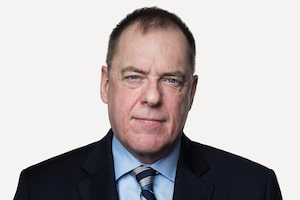The first Conservative Leader whom Marjory LeBreton worked for was John Diefenbaker. She was leader of the government in the Senate under Stephen Harper, before being sidelined by the Senate expenses scandal. She is well known in the party as a Red Tory: supportive of small government, but progressive on social issues. And she is worried about her party.
"My fear is that Canadians … will be influenced by the excessive partisanship and deep divide we are witnessing in U.S. politics and come to the conclusion that Canadian Conservatives are the same," she wrote me Tuesday.
In the wake of last weekend's violence in Charlottesville, Va., Conservatives "must step up to define ourselves right now as to who we are and what we stand for and more importantly what we stand against and what we will not tolerate," the retired senator said. "… Getting caught up in the politics of conservatives south of the border will do irreparable harm to our good and decent party."
Read more: Combative Trump insists there is 'blame on both sides' for clashes in Virginia
On Sunday, Conservative Leader Andrew Scheer (whom Ms. LeBreton did not support during the leadership campaign) also condemned "these acts of racism, violence and hatred."
But a strain of populist, anti-immigrant nativism runs through the Conservative Party, which previous leaders have at times suppressed, and at times exploited.
Charlottesville confronts Canadian Conservatives with a choice: to play footsy with intolerants, or to expel them from the party and the movement. Which will Mr. Scheer choose? One clue will be how he responds to the growing furor in this country over Rebel Media.
In June, Statistics Canada reported that almost half of all hate crimes in 2015 were based on racial or ethnic animus. In January, a shooter with extreme right-wing views allegedly killed six people at a mosque in Quebec City.
Small groups of extreme right-wing protesters have held rallies in various cities, with another planned for Vancouver on Saturday. Counterprotesters also plan to be there.
Mr. Scheer, who declined to be interviewed for this piece, maintains that he wants the Conservative Party of Canada to be open to all.
"We are a very inclusive party," he told the Toronto edition of Metro in June. "We send a very positive message. We stand up for the rights of all different kinds of people all around the world."
But the party he leads contains conflicting impulses. At its best, the Conservative Party under Mr. Harper could rightly claim to be the only conservative party in the developed world that had strong support from immigrant voters.
But in the 2015 election campaign, Mr. Harper and his party attacked the niqab worn by some Muslim women, and assailed "barbaric cultural practices." The leadership campaigns of social conservatives such as Kellie Leitch, Brad Trost and others appeared to reveal that about one Conservative Party member in seven is more Trumpesque than Harperesque (pre-2015) in outlook.
And Mr. Scheer has his own populist streak, such as his campaign pledge to cut funding to universities that don't protect the right of free speech on campuses.
Many Canadian Trump supporters are avid watchers of Rebel Media, an online platform that commentator Ezra Levant established after the conservative news channel Sun News went off the air.
The Rebel is strongly pro-Trump and anti-immigrant, especially Muslim immigrants. Its commentators have indulged in anti-Semitic screeds. It has interviewed American white-supremacist leader Richard Spencer.
But the violence at Charlottesville shocked even Mr. Levant, who issued a memo to staff Monday saying Rebel Media does not support the alt-right, the umbrella term for white supremacists, fascists and other racists who demonstrated in Charlottesville.
"That term now effectively means racism, anti-Semitism and tolerance of neo-Nazism," he wrote. "… We believe that character and ideas and actions are more important than skin colour, or for that matter sex or sexual orientation."
This was not enough to keep Brian Lilley, one of Rebel Media's most prominent commentators, and freelance contributor Barbara Kay from quitting.
"I am not comfortable being associated with a group that, rightly or wrongly, is being increasingly viewed as associated with the likes of Richard Spencer," Mr. Lilley said on Facebook. "… I am also not comfortable with the increasingly harsh tone taken on issues like immigration, or Islam."
Other voices agree. Conservative MP Michael Chong declared he would never appear on the Rebel. Doug Schweitzer, a candidate for the leadership of the new United Conservative Party in Alberta, also announced he would boycott the site.
"Conservative politicians should no longer be participating in a platform that allows for the facilitation of hate," he told the CBC. Brian Jean and Jason Kenney, the front-running candidates for the leadership, had not at press time joined the boycott.
Mr. Scheer has appeared on the Rebel in the past, and his campaign manager is a director of the company, though the platform is no fan of his leadership. Mr. Levant called him a "backstabber" for supporting the Paris climate accord.
Mr. Scheer probably can't, and shouldn't, order his MPs not to appear on Rebel TV, though he might want to consider keeping off it himself.
Far more important is persuading all Canadians – including immigrant Canadians and Muslim Canadians both newly arrived and native born – that his party embraces them, shares their values and that he will not countenance voices of exclusion or resentment within his caucus or the conservative movement.
He will have to say that very loudly, and act with conviction, if he is to prevent what Ms. LeBreton fears: the tarring of the Conservative movement in Canada with the American brush of intolerance.
 John Ibbitson
John Ibbitson